
Related
Topics
Although a jury ruled Moussaoui is eligible for the death penalty on Monday, Rowley says administration officials may stop using criminal courts for future cases. “If you don’t deal with them in the criminal court then you are allowed to go around all criminal procedure and the Constitution,” she said. [includes rush transcript]
We turn now to the trial of Zacarias Moussaoui. On Monday, a jury ruled Moussaoui is eligible for the death penalty in connection to his role in the 9/11 attacks. Moussaoui has already pleaded guilty to conspiring to hijack aircraft with al-Quaida and other crimes. He’s claimed he was supposed to have been part of the 9/11 plot and that he was training to fly a fifth hijacked plane into the White House on that day. He’s said he lied to the FBI after his arrest to allow the Sept. 11 attacks to go forward. The trial will now move into its second phase, where the jurors will decide whether Moussaoui should be executed.
The case against Moussaoui has brought embarrassment to prosecutors and government officials. Last month, a judge barred the testimony of several prosecution witnesses after it was revealed a government lawyer had violated court rules by improperly coaching them. And just days later, a former FBI supervisor revealed during testimony that he did not read a memo that had warned of possible hijackings before the 9/11 attacks.
Many people who lost loved ones on 9/11 attended the trial. Abraham Scott, whose wife Janice Marie Scott died in the attack on the Pentagon, shared his thoughts after the verdict was read.
- Abraham Scott, his wife Janice Marie Scott died in the attack on the Pentagon on 9/11.
We’re joined now by Coleen Rowley.
- Coleen Rowley, former FBI Special Agent turned whistleblower. She has accused FBI officials of hampering the investigation of Zacarias Moussaoui and ignoring critical warnings before the 9/11 attacks. She speaks to us from Minnesota where she is running for Congress.
- Website: ColeenRowley.com
Transcript
AMY GOODMAN: Abraham Scott, whose wife, Janice Marie Scott, died in the attack on the Pentagon, shared his thoughts after the verdict was read.
ABRAHAM SCOTT: Even though I do believe that he deserves the death penalty, I also equally blame the government for not acting on certain indicators that could have prevented 9/11 from happening. I would also say that I love my wife truly, and I know that whatever happens to him will not bring her back. But I do believe that the death of Moussaoui will bring comfort to those families, as well as individuals across the world and this country that have been impacted adversely with the tragedy on September 11, 2001.
AMY GOODMAN: That was Abraham Scott. His wife, Janice Marie Scott, died in attack on the Pentagon. We’re joined now by Coleen Rowley. She is the former F.B.I. special agent turned whistleblower, who accused F.B.I. officials of hampering the investigation of Zacarias Moussaoui and ignoring critical warnings before the 9/11 attacks. She was chosen Time “Woman of the Year.” She is now running for Congress, and she speaks to us from Minnesota. Welcome to Democracy Now!
COLEEN ROWLEY: Thanks for having me.
AMY GOODMAN: It’s good to have you with us, Coleen Rowley. Can you talk about what we know at this point of Zacarias Moussaoui and how you dealt with him in the past, what you understood?
COLEEN ROWLEY: Well, this case is just an absolute showcase for all of these major issues right now in the so-called war on terrorism. And I could probably talk for a couple of hours about many of the issues involved. I don’t want to actually talk about the facts, simply because this case is not over, and it’s going to a death penalty phase now, where another jury is going to be hearing further evidence about the specific facts.
But, you know, the big issue here is whether a suspected terrorist can be dealt with in our criminal courts. And if you buy the argument, as many administration officials have made now, that this actually might be the last case. I’ve actually heard that, people saying this is the last time you’re ever going to see a terrorist dealt with in our criminal courts. And, of course, if you don’t deal with them in the criminal courts, then you’re allowed to go around all criminal procedure and the Constitution. So, like I said, this is a huge case in terms of many, many legal issues.
AMY GOODMAN: Can you talk about the testimony of your fellow F.B.I. agent, Samit? He said he sent, was it 90 emails, memos to those above?
COLEEN ROWLEY: Well, of course, my 12-page memo, this — long time ago now, you know, seems like ancient history, but my 12-page memo that was written in May of 2002 was written for this reason, that in order to fix the things that went wrong pre-9/11 you have to deal with the truth. And for eight or nine months, even after 9/11, many of the solutions, you know, supposed solutions to what went wrong were really not on the mark. And that was because a lot of these facts were being sugarcoated. And I think “cover-up” was a little too strong, but certainly they were being glossed over.
What you see in this case is the agents at the bottom of the chain did it right, and the people at the top, you know, the administrators in their kind of ivory-covered palaces or whatever, didn’t understand the situation. Most terrorists are thwarted really due to people, good agents and good investigative work, and oftentimes it’s like a trooper who stops a terrorist. The Ressam case, the case of the millennium bomber, is actually a model of how it should be done. In that case, a customs inspector was able to stop a terrorist on their way down from Canada in 2000 to bomb the Los Angeles airport. And then, of course, the criminal justice system was good in that it handled this case fine and was able to get the cooperation, actually, of that terrorist and actually provided a lot of information that helped us combat future terrorists.
AMY GOODMAN: Coleen Rowley, I wanted to ask you where you think terror suspects should be charged and get your response to the Supreme Court ruling not to take a case that would have determined whether the President has the power to indefinitely jail U.S. citizens without ever pressing charges, the Jose Padilla case, the court deciding not hear his appeal, the U.S. citizen held without charge in a Navy brig for three-and-a-half years.
COLEEN ROWLEY: Well, it’s important to understand that the court here did not really rule on the merits of this enemy combatant status. In fact, if anything, it seemed to criticize that this is outside our Constitution. All they did in this case was say that the case is no longer ripe for judicial — to hear it. It’s moot, because he was transferred to criminal courts at this point or to a — excuse me, to a military tribunal. I think that we do need — again, I’m just really arguing the urgency of looking at these issues from the legal perspective right now, because so many people say we can’t use our Constitution to investigate terrorists nor to deal with them after they’re caught.
[These people say] we need to do things like rendition and enemy combatant status and even torture, for instance, which is certainly outside the Constitution. We need to use those tools, because this is a new war. Everything’s changed after 9/11, and our old system is no longer capable. And I think it’s an absolutely huge issue, because what we’re also going to see is, as time goes on, more and more Americans like Padilla, actually. Padilla, of course, was a homegrown American. And al-Qaeda terrorists are going to be using more and more people that blend in and fit in. And then we’re going to get this blend between domestic — you know, certainly our domestic criminal justice system and what we would normally think of as the international terrorist and counterterrorism.
AMY GOODMAN: Coleen Rowley, I want to thank you for being with us, former F.B.I. special agent accused F.B.I. officials of hampering the investigation of Zacarias Moussaoui, ignoring warnings of possible hijackings. She was named Time “Woman of the Year” and is now running for Congress. We speak to her in Minneapolis.

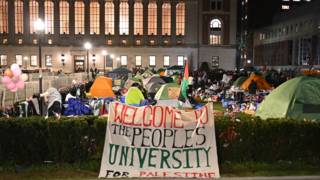
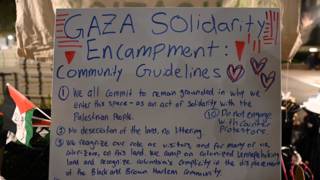
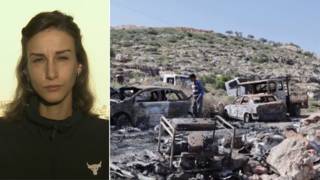
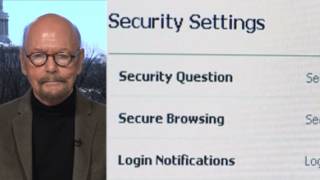





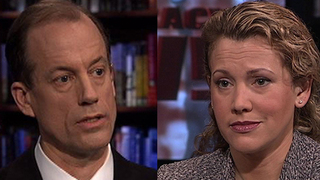

Media Options